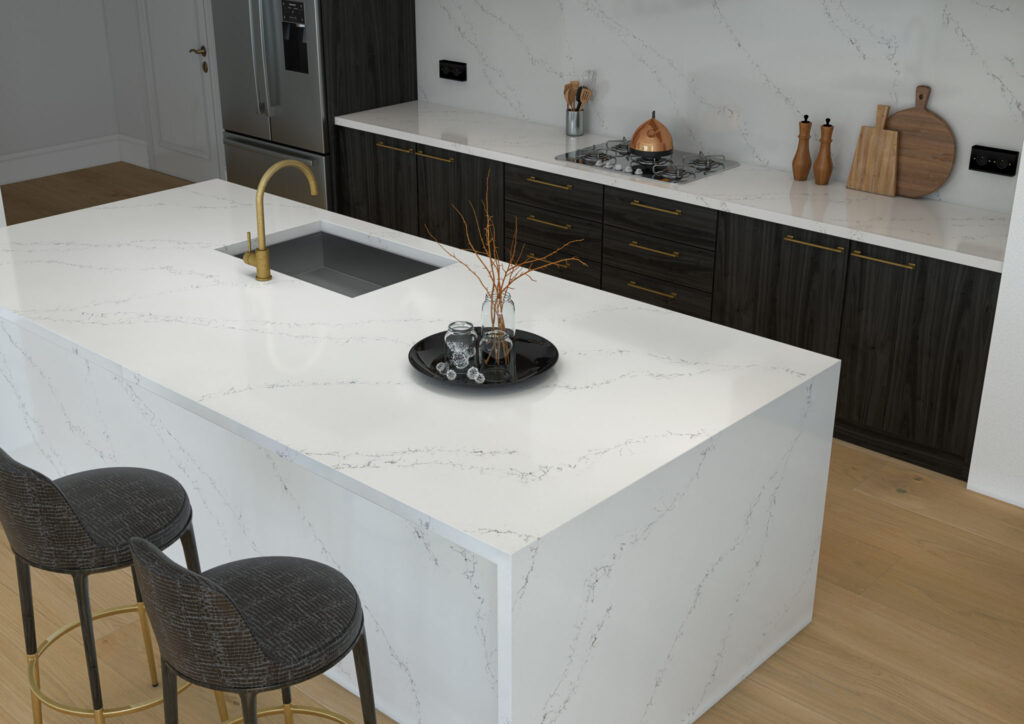
Introduction
Selecting the correct worktop material would be one of the most important decision when it comes to designing or remodeling a kitchen. Given the many possibilities, two of the most selection commonly used today are quartz and granite. The two kinds of finish have excellent characteristics; they are durable, they are very attractive and they will enhance functionality but the two are distinct. In this article you will find out the essential difference between quartz and granite, advantages and disadvantages of each material, and what to consider when making the decision.
& the set of recommendations is as follows:
What is Quartz?
Quartz worktops are completely man-made and are produced through a process of blending Quartz crystals with resins pigments and other materials. Commonly, quartz materials contain between 90 and 95% natural quartz and the rest is resins and binders. This manufacturing process gives a non porous, highly durable and versatile worktop with a stone like appearance.
Advantages of Quartz Worktops
1.Durability: The quartz is tougher than the other stones in handling abrasion and chipping hence suitable for usage in areas such as the kitchen.
2.Low Maintenance: Quartz is lockers, non-porous and therefore does not need to be sealed; it does not harbour bacteria, liquids or stains hence it is very easy to clean.
3.Variety of Colors and Designs: Engineered quartz also exists in an array of colors and designs, in the likes of marble or granite.
4.Consistency in Appearance: While natural stone exhibits probability of probability of a contrast pattern and shade, quartz slab gives a uniform top look and feel to the kitchen.
5.Heat and Impact Resistance: Quartz surfaces are somewhat heat tolerant but can stand the heat of a regular kitchen service.
Flaws of Quartz Worktops
Cost: High quality quartz can be even costlier than some types of granite due to the brands it may come with.
Not Fully Heat-Resistant: Despites its capability for withstanding moderate heat, one should not place hot pans directly on the quartz since the resin will be harmed and may affect discolouration or even crack.
Not as Natural: There are those people who have a preference in the natural flecks and grains especially in granite, which cannot be emulated by quartz.
I found only that their main mission is described in this paragraph:
What is Granite?
Granite worktops are therefore made from natural stone slabs that are quarried, cut and polished. Granite is an igneous rock containing quartz, feldspar, and mica; its look is natural and unyielding. Granite is unique and possesses its unmatched pattern and shade which makes the kitchen more appealing and beautiful.
Importance of Granite Worktops
1.Natural Beauty: Granite is elegant or traditional, non-porous, has distinct pattern and color difference per each slab.
2.Heat Resistance: Granite is heat resistance, that means hot pots and pans can be placed on the surface without the risk of it melting.
3.Durability: Granite worktops when well maintained can be a lifelong investment. One is that they are relatively scratch resistant and durable to further tasks that entail rough usage.
4.Value Addition: Granite is widely considered to be a better material, which can even increase the market value of your home impressively.
Disadvantages of choosing granite worktops
Reason against granite worktops, Reason not to use granite worktop
Maintenance: Marble is slightly more delicate than granite because this stone is permeable and must be resealed periodically to avoid stains and bacteria penetrate its surface.
Cost: Granite also can be a costly affair depending on color or pattern and extent of variation it may provide.
Inconsistent Patterns: While most people find these patterns to be a strength, it may be that for some specific homeowners, quartz’ sheer consistency will be a bonus.
Comparing Quartz and Granite: Key Differences
| Feature | Quartz | Granite |
| Composition | Engineered (90-95% quartz) | Natural stone |
| Appearance | Uniform, wide color options | Unique, natural patterns |
| Durability | Scratch and chip resistant | Very durable but can chip under impact |
| Maintenance | Low, no sealing required | High, needs regular sealing |
| Heat Resistance | Moderate | High |
| Cost | Medium to high | Medium to high |
| Sustainability | Can have environmental impact due to resins | Natural but involves quarrying |
Quartz vs Granite Countertops: How to Decide
1.Budget: They are both expensive; however, granite can be much more if it is rare. If you are not willing to spend much money on your kitchen or bathroom remodel and do not want anything too fancy that requires special care, than perhaps quartz would be fitting for you.
2.Style and Aesthetic: If you consider the natural and extraordinary appearance with variations, it is better to choose a granite one. On the other hand if you are looking forward to having a neat and smooth surface with many more colors to select from than granite quartz is the best bet.
3.Maintenance: Quartz does not need harsh maintenance while granite should be resealed occasionally to prevent outer forces such as stains and bacteria. However, if you would like a work surface that needs very little attention then quartz is actually the better choice.
4.Durability and Usage: Another feature that may come in handy for families who like to cook and invite their guests over is that quartz is a very scratch and stain repellent material. But if you tend to set hot pans right on your counters, then that’s where granite beats everything else because it is heat resistant.
5.Sustainability: Granite we get from the market is an actual stone; but the process of extracting the stone affects the environment. While quartz is engineered and thus involves chemicals, such as resins, it generally lacks ecological friendliness. If being environmentally friendly is an important to you then do consider the sustainable brands.
The advantage of BCG matrix analysis is that this method focuses on shareholders by _________.
The Verdict: Quartz or Granite?
Quartz and granite both are good materials, have their good aspects and are good to be used in kitchen worktop. If you aim to have a surface material that requires little work, is standardized in appearance and extremely durable then quartz is for you. But if you cherish natural beauty, non-replicability and heat resistant feature then granite is worth for your kitchen.
Finally, it all depends with your pocket, preference of design and how you intend to use the kitchen. Regardless of which type of worktop you opt for, the addition of a high quality work surface will improve the performance and appearance of your area in addition to increasing the value of the property.
Conclusion
Quartz and granite countertop comparison must be done with respect to the aspects highlighted below, considering the nature of your usage of the kitchen. Each material has its beauty, durability, and usefulness; reviewing the peculiarities of their use will help you choose the best option for your house.


